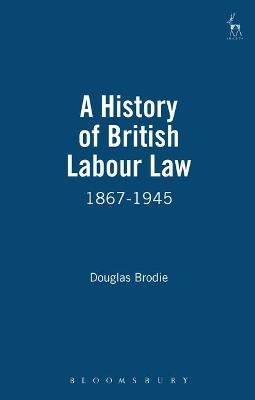
A History of British Labour Law
1867-1945
Seiten
2003
Hart Publishing (Verlag)
978-1-84113-015-6 (ISBN)
Hart Publishing (Verlag)
978-1-84113-015-6 (ISBN)
This work examines the received wisdom that, British labour law was abstentionist or non-interventionist, by looking at the role given to law.
In the UK the received wisdom has tended to be that,historically, British labour law was abstentionist or non-interventionist, best epitomised by the words of Lord Wedderburn who has written that '...collective bargaining has developed in a system which depends very little on the law, which is covered by very few decisions of the judges, and which is controlled by statute very little, if at all.'. It is not until we reach the Industrial Relations Act 1971 that we discover the first attempt in peacetime to move to a legally regulated system. However, the accuracy of this non-interventionist depiction appears to very much depend on the period which is examined, which is why an historical perspective is needed in order to understand the significance of the current shape and scope of British labour law. The aim of this work is to re-examine the received interpretation by looking at both the role given to law, and that anticipated and argued for it, during the most formative period of its development, the period between 1867 and 1945.
The book also revisits the debate about war-time legislation which has tended to be viewed as standing apart from mainstream labour law but which the author demonstrates to have important linkages to the past and present.
In the UK the received wisdom has tended to be that,historically, British labour law was abstentionist or non-interventionist, best epitomised by the words of Lord Wedderburn who has written that '...collective bargaining has developed in a system which depends very little on the law, which is covered by very few decisions of the judges, and which is controlled by statute very little, if at all.'. It is not until we reach the Industrial Relations Act 1971 that we discover the first attempt in peacetime to move to a legally regulated system. However, the accuracy of this non-interventionist depiction appears to very much depend on the period which is examined, which is why an historical perspective is needed in order to understand the significance of the current shape and scope of British labour law. The aim of this work is to re-examine the received interpretation by looking at both the role given to law, and that anticipated and argued for it, during the most formative period of its development, the period between 1867 and 1945.
The book also revisits the debate about war-time legislation which has tended to be viewed as standing apart from mainstream labour law but which the author demonstrates to have important linkages to the past and present.
Douglas Brodie is a Reader in Law at the University of Edinburgh.
Introduction 1. Labour Law 1867-1880 2. Labour Law 1880-1900 3. 1900-1914 4. Responding to Taff Vale 5. The Impact of War 1914-18 6. The Aftermath of War 1918-21 7. Labour Law Between the Wars 8. The Impact of the Second World War 9. Concluding Remarks
| Erscheint lt. Verlag | 17.9.2003 |
|---|---|
| Verlagsort | Oxford |
| Sprache | englisch |
| Maße | 138 x 216 mm |
| Themenwelt | Geschichte ► Teilgebiete der Geschichte ► Kulturgeschichte |
| Recht / Steuern ► Arbeits- / Sozialrecht ► Arbeitsrecht | |
| Recht / Steuern ► EU / Internationales Recht | |
| ISBN-10 | 1-84113-015-X / 184113015X |
| ISBN-13 | 978-1-84113-015-6 / 9781841130156 |
| Zustand | Neuware |
| Haben Sie eine Frage zum Produkt? |
Mehr entdecken
aus dem Bereich
aus dem Bereich
der stille Abschied vom bäuerlichen Leben in Deutschland
Buch | Hardcover (2023)
C.H.Beck (Verlag)
23,00 €
Die Revolution des Gemeinen Mannes
Buch | Softcover (2024)
C.H.Beck (Verlag)
12,00 €
vom Mittelalter bis zur Gegenwart
Buch | Softcover (2024)
C.H.Beck (Verlag)
12,00 €


